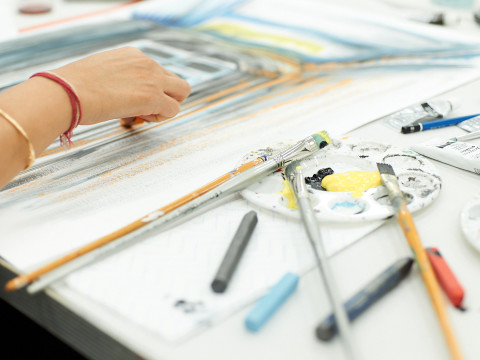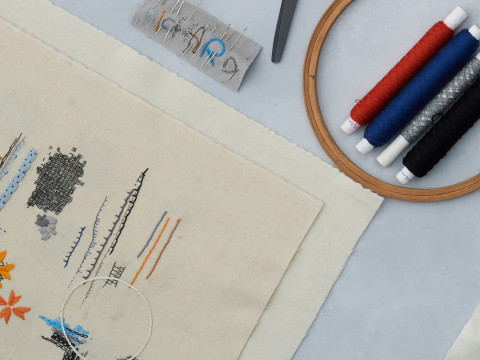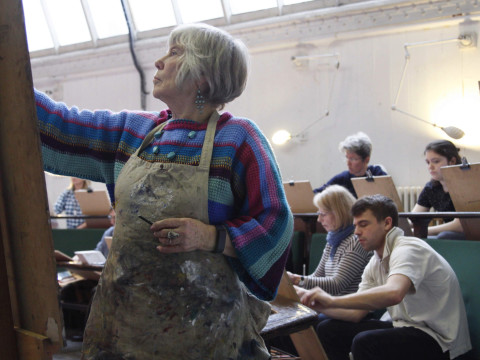
Art crime: the myth vs the reality
Weekend-long art history and theory course
6 April 2019 10am - 5pm7 April 2019 10am - 5pm
Wolfson British Academy Room, 6 Burlington Gardens, Royal Academy of Arts
£420. Includes all materials, light refreshments at the beginning of each day and wine reception at the end of day one.
Terms and conditions
This weekend-long course explores this gripping world of art crime including looting and theft, forgeries and vandalism, drawing on real cases and exploring the difference between myth and reality.
From The Adventures of Indiana Jones to The Monuments Men, art crime captures the public imagination and is never far from the news or the movies. However, how close does this comes to reality? Through the wide-ranging practical experience of invited speakers, this course will introduce participants to the different forms of crime against art and will provide an understanding of the reality behind the stories covered in the news and media. Areas of particular focus will include the theft of art and antiques from museums and private individuals; the looting and theft of antiquities across the world; and the recovery of Nazi looted art.
Questions that will be answered in the course cover: How does art crime affect artists, collectors, institutions, and the market today? How do you track down stolen and looted art? What happens when stolen works resurface? Other areas of art crime will be touched upon, including fakes and forgeries, iconoclasm and vandalism, as well as more financial crimes such as consignment fraud or money laundering.
The practical experience of the course directors and guest speakers will be used to illustrate these various forms of art crime and the diverse way in which they are tackled and resolved. The context for this fight against art crime will also be recognised, and the crucial role that the art market has to play.
Throughout the weekend the speakers will encourage those attending to recognise the difference between crime as presented by the press or within popular culture, and the reality of every day work for those who fight art crime. Attendees will also be introduced to research tools that aid the detecting of works with a problematic past. The course will conclude with a practical exercise, allowing participants to put to use their understanding of the issues raised over the weekend.
£420. Includes all materials, light refreshments at the beginning of each day and wine reception at the end of day one.
Terms and conditions

James Ratcliffe
James Ratcliffe is General Counsel at the Art Loss Register and leads their recoveries team, who are working on the recovery of hundreds of artworks each year. James trained as an archaeologist before qualifying as a solicitor. Having worked as a litigator in private practice in London for several years he then joined the ALR in 2013. As a trained mediator James focuses on the resolution of claims with recourse to the courts.

Amelie Ebbinghaus
Amelie Ebbinghaus is a provenance researcher at the Art Loss Register and manages their German-speaking clients. Her focus is on research and restitution of Nazi-looted art. Amelie trained as a lawyer in Germany and worked in Intellectual Property litigation in Berlin and Hamburg for several years. She also studied art history and completed an MSc in Art, Law and Business before joining the ALR in 2016.
This course provides a unique opportunity to learn about a wide variety of art crimes, from looting and theft to forgeries and vandalism. The course is led by James Ratcliffe and Amelie Ebbinghaus of the Art Loss Register and will reference a number art crimes throughout history.
This course will be delivered primarily through lectures but will also include an opportunity for debate and discussion from participants.
The course is held in the historic setting of the newly opened Wolfson British Academy Room.
You will enjoy the intimate and friendly setting and a course which is designed both to provide a historical overview of this fascinating topic for those new to the field or explore it further for those with long-standing interest in the topic.
This course is suitable for those with no prior knowledge of this field as well as those with previous experience who would like to develop their understanding further and in a small group setting.
This course is for you if:
• You have a general interest in art history and would like a novel way to understand cultural, aesthetic and historical change through looking at art and architecture
• You have a specific interest in the criminological side of art history, and its legal and moral implications
• You have a personal or professional interest in how art crime affects institutions and the market and how it can be presented, interpreted and viewed by different audiences, over time and different historic periods.
• You would like to deepen and enrich your knowledge with an expert perspective and explore in detail the development of research into stolen and looted art, and its recovery
Minimum age 18
What's included?
• A rich combination of lectures, discussion and the opportunity for expert-led analysis from leading scholars and experts in the field
• An exploration of the history of art from a novel perspective
• Skills and knowledge relevant to those with art historical, curatorial interests and art crime interest
• The opportunity to learn from art-world experts
• The opportunity to socialise and network with peers in a friendly environment
• Light refreshments throughout the weekend
• A drinks reception and social on Saturday following the days session
• A certificate of participation upon course completion

Our courses and classes programme
Our programme of short courses and classes offers the opportunity to explore a range of subjects, led by expert tutors and practising artists.
Related events
 Short courseFree
Short courseFreeThe Primary Art School
9 January - 12 June 2025
 Short course
Short courseModernism around the world
4 February - 11 March 2025
 Short course
Short courseThe Art of Carnival
1 March 2025
 Short course
Short courseBotanical art
11 March - 8 April 2025
 Short course
Short courseExploring ink: method and imagination
29 March - 30 March 2025
 Short course
Short courseDepicting the figure: Renaissance to Modernism
29 April - 27 May 2025
 Short course
Short courseRevolutionaries and Romantics: art and literature in France
17 May - 18 May 2025
 Short course
Short courseOil painting: techniques and discovery
17 May - 18 May 2025
 Short course
Short courseSketch with stitch
21 June - 22 June 2025
 Short course
Short courseConnoisseurship summer school: who painted what, when and how to tell
1 July - 5 July 2025
 Short course
Short courseLife drawing summer school
8 July - 12 July 2025
 Short course
Short courseDrawing with anatomy
15 July - 19 July 2025
 Short course
Short courseExpressive life drawing: observation and imagination
15 July - 19 July 2025
 Short course
Short courseLandscapes: van Gogh and his influence
2 September - 6 September 2025